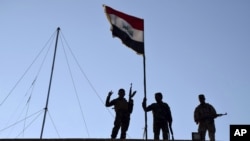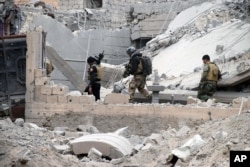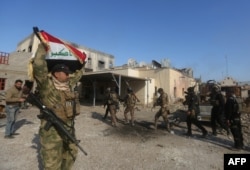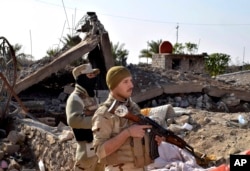The words had been promised for months, and finally they were heard: "I am pleased to announce the liberation of Ramadi."
It was a rare victory statement by Iraqi Prime Minister Haider al Abadi, whose country has been battered by Islamic State terror.
But even as Baghdad celebrated Monday, leading Iraqi politicians and analysts were warning that without empowering the country's Sunni population, the larger fight against Islamic State extremists is far from over.
"Without a political strategy, there is only a military victory which can and will only be transient," Iraq's former vice president Ayad Allawi told VOA.
"There has been no progress on reconciliation," Allawi warned. "The conditions fostering terrorism will remain if the government does not embark on reform and reconciliatory efforts to engage marginalized Iraqis into an all-inclusive political process based on the rule of law, justice and civil state building."
Islamic State militants have drawn heavily on alienated Sunnis, exploiting the deep sectarian divisions between them and the Shi'ite-led governments that have ruled Iraq since 2005.
U.S. reaction
U.S. officials also were cautious about declaring victory.
One U.S. official familiar with the Ramadi operation told VOA on condition of anonymity that it is "too early to call it a total defeat" of IS. "It's more appropriate to call it a strategic step in the right direction."
Baghdad's ability to sustain control of the city, rebuild and govern, will be key moving forward, added a U.S. counterterrorism official.
Michael Pregent, adjunct fellow at the Hudson Institute, said there will not be any clear win in Ramadi for at least another six months to a year.
"It is not just the destruction of the city that is a victory — you have to resettle the population and bring economic stimulus, provide security," Pregent said.
"Ramadi was leveled," he said. "There is no intact building left, there is little infrastructure that is inhabitable. You can't go there tomorrow and open a store, the buildings have been rubbled."
It also is unclear what happened to the hundreds or even thousands of civilians who were trapped in the city.
Retaliation predicted
The largely Sunni city of Ramadi was IS's second-largest urban stronghold in Iraq after Mosul, and the symbolic center of the extremist group's control in Iraq's western Anbar province.
An amalgam of Iraqi special forces, army, federal police and local Sunni tribes backed by heavy U.S.-led coalition support retook the heart of the city over the past few days.
"Ramadi is a major win politically for both Prime Minister Abadi's shaky government and the U.S.-led coalition," Alex Mello, lead Iraq security analyst at Horizon Client Access, told VOA.
But Mello also warned of more bloodshed: "We're likely to see score settling and retaliatory killings by Sunni militia forces against rival tribes that threw in with IS when they overran the city."
The longer-term challenge, Mello added, will be establishing neighborhood-level security inside Ramadi and clearing the historic insurgent support areas in the suburban and rural areas surrounding the city.
Follow-up crucial
The Islamic State appeared to have pulled most of its fighters out of the city before Iraqi Security Forces surrounded Ramadi, leaving only a core of about 400 fighters in the city.
"If the Iraqi Security Forces fail to follow up, and allow IS to recover, the insurgents will continue to filter into Ramadi city, keeping the ISF locked in a prolonged urban stalemate," Mello warned.
He said, moreover, that if the ISF were prematurely redeployed out of Ramadi and left local Sunni police in the city without adequate support, Islamic State fighters probably would attempt to take over the city again.
Franc Milburn, a former British military officer and now an Iraq political risk analyst, agreed that the Islamic State strategy is typically to launch diversionary attacks in order to relieve pressure on its forces, and to circle back and re-attack areas it has lost.
"Taking Ramadi is like dropping a pebble in the ocean," Milburn told VOA via Skype. "Ramadi is not that significant unless the ISF can control the province of Anbar and the border with Syria."
"The need now is the military should try and seal off Anbar and that very porous border with Syria, because without that you will still have IS using supply and control zones from Syria," Milburn said. "I think it is going to be a very, very big task. They really don't have the manpower to take over Anbar."
U.S. Secretary of State John Kerry on Monday cautioned that Ramadi is not yet "fully secure" and that additional parts of the city still have to be retaken.
Iraqi forces are still fighting a "ruthless adversary employing suicide bombers, snipers and improvised explosive devices," Kerry said in a statement.
Pentagon spokesman Col. Steve Warren said the coalition supported the Ramadi operation with more than 630 airstrikes, months of training, and specialized equipment to clear the hundreds of bombs planted around the city.

















